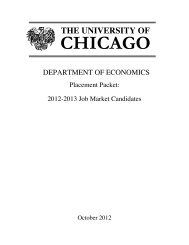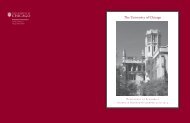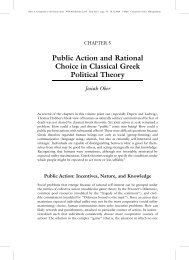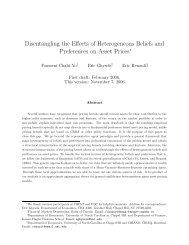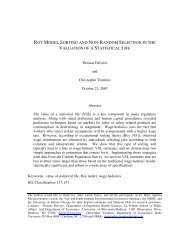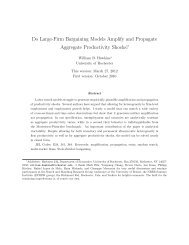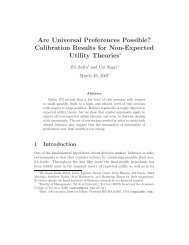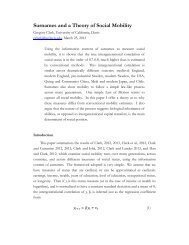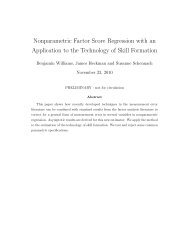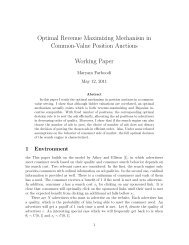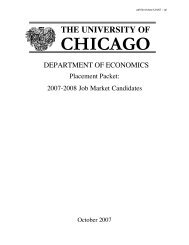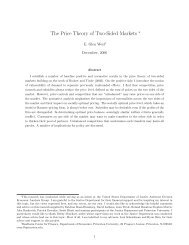CHICAGO - University of Chicago Department of Economics
CHICAGO - University of Chicago Department of Economics
CHICAGO - University of Chicago Department of Economics
You also want an ePaper? Increase the reach of your titles
YUMPU automatically turns print PDFs into web optimized ePapers that Google loves.
5330 S. Blackstone Av. Apt.311<br />
<strong>Chicago</strong>, IL 60615<br />
773-273-0127<br />
PEDRO GETE<br />
pgete@uchicago.edu<br />
http://home.uchicago.edu/~pgete<br />
Education Ph.D. in <strong>Economics</strong> <strong>University</strong> <strong>of</strong> <strong>Chicago</strong> Expected June 2009<br />
M.A. in <strong>Economics</strong> <strong>University</strong> <strong>of</strong> <strong>Chicago</strong> June 2004<br />
J.D. Universidad Carlos III, Madrid, Spain June 2002<br />
B.A. in <strong>Economics</strong> Universidad Carlos III, Madrid, Spain June 2002<br />
Fields<br />
Job market<br />
paper<br />
Working paper<br />
Macroeconomics, International Finance, Monetary economics<br />
“Housing Markets and Current Account Dynamics”<br />
I model global imbalances as arising from changes in preferences for housing relative to tradable goods. The key<br />
ingredients in the model are labor reallocation across sectors and consumption smoothing between housing and<br />
tradable goods. Countries import goods during periods when more domestic labor is devoted to housing<br />
construction. Housing booms are larger and more persistent in countries that can run trade deficits. This occurs<br />
despite the absence <strong>of</strong> wealth effects, and even if trade is not primarily concentrated in capital goods. I provide<br />
several types <strong>of</strong> evidence to support the theory: First, over the last decade housing variables have decoupled from<br />
the business cycle while consumption and consumer durables have not. Second, for the same period there is a<br />
strong cross country correlation between housing variables and current account dynamics. Third, a parameterized<br />
version <strong>of</strong> the model generates cross section correlation between the labor share employed in construction (or<br />
value added from the construction sector) and the trade balance which is consistent with recent global imbalances.<br />
Fourth, I use sign restrictions implied by the model to estimate a vector autoregression and identify the effects <strong>of</strong><br />
housing specific shocks on the U.S. trade deficit. The results imply that housing shocks are an important driving<br />
force <strong>of</strong> current account dynamics.<br />
“Savings, Investment and Endogenous Fertility under Uncertainty” (work in progress)<br />
Presentations Macro/International Workshop, <strong>University</strong> <strong>of</strong> <strong>Chicago</strong>-GSB. October 2008<br />
Board <strong>of</strong> Governors <strong>of</strong> the Federal Reserve. Washington D.C. July 2008<br />
Economic Dynamics, Capital Theory Working groups, The <strong>University</strong> <strong>of</strong> <strong>Chicago</strong>. 2006, 2007, 2008<br />
Research<br />
experience<br />
Teaching<br />
experience<br />
Dissertation Internship. Board <strong>of</strong> Governors <strong>of</strong> the Federal Reserve. Summer 2008<br />
Internship. Bank <strong>of</strong> Spain. Madrid, Spain. Summer 2006<br />
Research Assistant for Anil Kashyap, The <strong>University</strong> <strong>of</strong> <strong>Chicago</strong>. 2006, 2007 and 2008<br />
Research Assistant for Monika Piazzesi, The <strong>University</strong> <strong>of</strong> <strong>Chicago</strong>. 2005 and 2006<br />
MBA courses at <strong>University</strong> <strong>of</strong> <strong>Chicago</strong> Graduate School <strong>of</strong> Business:<br />
Understanding Central Banking (Assistant for Anil Kashyap). Spring 2006 and 2008, Fall 2007<br />
Macroeconomics (Assistant for Veronica Guerrieri). Winter 2008<br />
College Courses at Universidad Carlos III de Madrid, Spain:<br />
Macroeconomics I and II (Assistant for Silvio Rendon and Juan Ruiz). 2002- 2003<br />
Microeconomics (Assistant for Pedro Albarran). 2002- 2003<br />
Awards Harper Dissertation Fellowship. Social Sciences Division. <strong>University</strong> <strong>of</strong> <strong>Chicago</strong>. 2008-09<br />
Margaret Reid Dissertation Fellowship. <strong>Department</strong> <strong>of</strong> <strong>Economics</strong>. <strong>University</strong> <strong>of</strong> <strong>Chicago</strong>. 2007-08<br />
NBER Summer Institute Monetary <strong>Economics</strong>, invited graduate student (Doolittle grant). 2007<br />
Bank <strong>of</strong> Spain Fellowship. 2005-2007<br />
La Caixa Foundation Fellowship. 2003-2005<br />
Middlebury College French School Fellowship. Summer 1999<br />
Languages and<br />
Computer skills<br />
Spanish (native language), English and French (fluent)<br />
AMPL, Dynare, E-Views, Matlab, Stata<br />
References Anil Kashyap (Co-chair), <strong>University</strong> <strong>of</strong> <strong>Chicago</strong>-GSB 773 702 1235<br />
Monika Piazzesi (Co-chair), Stanford <strong>University</strong> 650 723 9289<br />
Samuel Kortum, <strong>University</strong> <strong>of</strong> <strong>Chicago</strong> 773 702 8251<br />
anil.kashyap@chicagogsb.edu<br />
piazzesi@stanford.edu<br />
kortum@uchicago.edu



